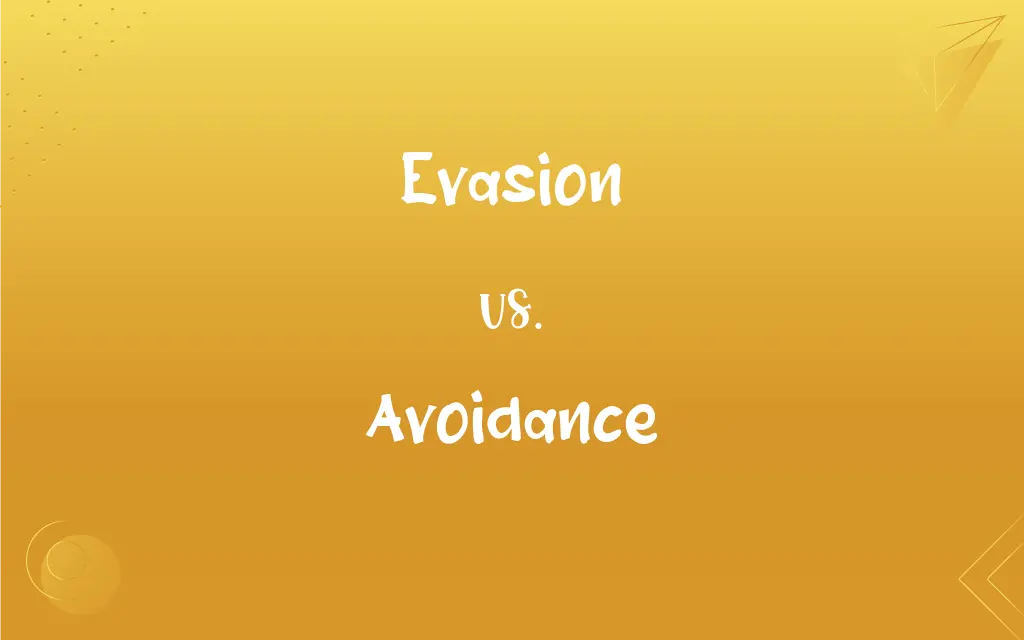Evasion vs. Avoidance: What's the Difference?
Edited by Aimie Carlson || By Janet White || Published on November 16, 2023
Evasion refers to deliberately escaping or eluding something, often in a deceptive or cunning manner. Avoidance means steering clear of something, often as a preventative measure, but without necessarily being deceptive.

Key Differences
Evasion and avoidance both concern the act of escaping or steering clear of something. However, evasion typically carries a negative connotation, implying a deceptive or cunning escape from a situation or obligation. Avoidance, on the other hand, is a broader term that refers to simply staying away from something, usually as a preventative measure, without necessarily involving deceit.
In legal contexts, evasion often pertains to a calculated act of avoiding responsibilities, especially to dodge legal repercussions, as in tax evasion. Avoidance in legal parlance can imply lawful means to reduce obligations, like tax avoidance through legal loopholes. In this sense, evasion is generally unlawful, while avoidance may be completely lawful.
From a grammatical standpoint, both words are nouns, although "avoid" and "evade" exist as verbs. Evasion is used more commonly in contexts where there is an element of subterfuge, such as in military or criminal situations. Avoidance is often used in psychological or medical terminology, as in "avoidance behavior," and doesn't inherently imply deceit.
In everyday language, evasion and avoidance may sometimes be used interchangeably, but they shouldn't be. Evasion implies a level of craftiness or deceit involved in dodging a situation. Avoidance lacks this implication and is more of a general term for steering clear of an undesirable situation, whether it's a conflict or an unhealthy food item.
Comparison Chart
Definition
Deliberate, often cunning escape
Preventative, non-deceptive escape
ADVERTISEMENT
Connotation
Usually negative
Neutral or situational
Grammatical Category
Noun
Noun
Legal Usage
Generally unlawful
May be lawful
Typical Context
Military, criminal
Psychological, medical
Evasion and Avoidance Definitions
Evasion
A calculated avoidance, usually unlawful.
Tax evasion is a federal crime.
ADVERTISEMENT
Avoidance
Non-engagement with a particular subject.
The avoidance of the topic was obvious.
Evasion
Cunning avoidance of capture or detention.
The thief's evasion astonished the police.
Avoidance
Deliberate distancing from a problem.
Her avoidance of conflict is problematic.
Evasion
A tactic to elude or escape.
The military used evasion techniques.
Avoidance
The act of shunning or avoiding.
Evasion
The act of escaping something through deceit.
His evasion of the question was noticeable.
Avoidance
(Law) An annulment.
Evasion
Artful dodging of a situation.
Her evasion of responsibility was clever but unacceptable.
Avoidance
The act of avoiding or shunning; keeping clear of.
Evasion
The act or an instance of evading.
Avoidance
The act of annulling; annulment.
Evasion
A means of evading; a subterfuge.
Avoidance
(obsolete) The act of becoming vacant, or the state of being vacant, specifically used for the state of a benefice becoming void by the death, deprivation, or resignation of the incumbent.
Evasion
The act of eluding or evading or avoiding, particularly the pressure of an argument, accusation, charge, or interrogation; artful means of eluding.
Avoidance
(obsolete) The act of dismissing a person.
Evasion
The act of eluding or avoiding, particularly the pressure of an argument, accusation, charge, or interrogation; artful means of eluding.
Thou . . . by evasions thy crime uncoverest more.
Avoidance
(obsolete) The act of quitting a position or benefice.
Evasion
A statement that is not literally false but that cleverly avoids an unpleasant truth
Avoidance
(obsolete) The course by which anything (especially water) is carried off.
Evasion
The deliberate act of failing to pay money;
His evasion of all his creditors
He was indicted for nonpayment
Avoidance
The act of annulling; annulment.
Evasion
Nonperformance of something distasteful (as by deceit or trickery) that you are supposed to do;
His evasion of his clear duty was reprehensible
That escape from the consequences is possible but unattractive
Avoidance
The act of becoming vacant, or the state of being vacant; - specifically used for the state of a benefice becoming void by the death, deprivation, or resignation of the incumbent.
Wolsey, . . . on every avoidance of St. Peter's chair, was sitting down therein, when suddenly some one or other clapped in before him.
Evasion
The act of physically escaping from something (an opponent or a pursuer or an unpleasant situation) by some adroit maneuver
Avoidance
A dismissing or a quitting; removal; withdrawal.
Avoidance
The act of avoiding or shunning; keeping clear of.
Avoidance
The courts by which anything is carried off.
Avoidances and drainings of water.
Avoidance
Deliberately avoiding; keeping away from or preventing from happening
Avoidance
The act of keeping away from something.
His avoidance of vegetables is frustrating.
Avoidance
A preventative measure.
Sunscreen is a form of UV avoidance.
Avoidance
Steering clear of danger.
Seatbelts are a form of accident avoidance.
FAQs
What is Evasion?
Evasion refers to deliberately escaping or eluding something, often in a deceptive manner.
Are Evasion and Avoidance the Same?
No, evasion implies deceit or cunning, while avoidance does not.
Is Evasion Always Negative?
Generally, yes, as it often involves deceit or breaking rules.
In What Contexts is Avoidance Commonly Used?
It's commonly used in psychological and medical contexts.
Is Avoidance a Noun?
Yes, avoidance is also a noun.
In What Contexts is Evasion Commonly Used?
It's commonly used in military and criminal contexts.
What is Avoidance?
Avoidance refers to steering clear of something, often preventatively, without being deceptive.
Is Evasion a Noun?
Yes, evasion is a noun.
Can Evasion Ever Be Justified?
In rare cases, such as evading harm, it may be justified.
Is Avoidance Always Negative?
No, it can be a healthy and preventative measure.
Is Avoidance Always Justified?
It depends on the situation, as excessive avoidance can be problematic.
Can Avoidance Be Legal?
Yes, as in the case of using legal means to minimize taxes.
Is There a Verb Form of Avoidance?
Yes, the verb is "to avoid."
Can Evasion Be Legal?
Rarely, as it generally involves deceit or breaking laws.
Is There a Verb Form of Evasion?
Yes, the verb is "to evade."
About Author
Written by
Janet WhiteJanet White has been an esteemed writer and blogger for Difference Wiki. Holding a Master's degree in Science and Medical Journalism from the prestigious Boston University, she has consistently demonstrated her expertise and passion for her field. When she's not immersed in her work, Janet relishes her time exercising, delving into a good book, and cherishing moments with friends and family.
Edited by
Aimie CarlsonAimie Carlson, holding a master's degree in English literature, is a fervent English language enthusiast. She lends her writing talents to Difference Wiki, a prominent website that specializes in comparisons, offering readers insightful analyses that both captivate and inform.






































































